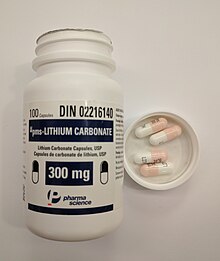
Back تسمم بالليثيوم Arabic Otrava lithiem Czech Intoxicación por litio Spanish Toxicité du lithium French リチウム毒性 Japanese ଲିଥିଅମ ବିଷକ୍ରିୟା OR Nhiễm độc lithi Vietnamese
| Lithium toxicity | |
|---|---|
| Other names | Lithium overdose, lithium poisoning |
 | |
| A bottle of lithium capsules | |
| Specialty | Toxicology |
| Symptoms | Tremor, increased reflexes, trouble walking, explosive diarrhea, kidney problems, altered level of consciousness[1] |
| Complications | Serotonin syndrome, brain damage[1] |
| Types | Acute, chronic, acute on chronic[1] |
| Causes | Excessive intake, decreased excretion[1] |
| Risk factors | Dehydration, low sodium diet, kidney problems[1] |
| Diagnostic method | Based on symptoms and a lithium level[1][2] |
| Treatment | Gastric lavage, whole bowel irrigation, hemodialysis[1] |
| Prognosis | Low risk of death[3] |
Lithium toxicity, also known as lithium overdose, is the condition of having too much lithium. Symptoms may include a tremor, increased reflexes, trouble walking, kidney problems, and an altered level of consciousness. Some symptoms may last for a year after levels return to normal. Complications may include serotonin syndrome.[1]
Lithium toxicity can occur due to excessive intake or decreased excretion.[1] Excessive intake may be either a suicide attempt or accidental.[1] Decreased excretion may occur as a result of dehydration such as from vomiting or diarrhea, a low sodium diet, or from kidney problems.[1] The diagnosis is generally based on symptoms and supported by a lithium level in blood serum of greater than 1.2 mEq/L.[1][2]
Gastric lavage and whole bowel irrigation may be useful if done early.[1] Activated charcoal is not effective.[1] For severe toxicity hemodialysis is recommended.[1] The risk of death is generally low.[3] Acute toxicity generally has better outcomes than chronic toxicity.[4] In the United States about 5,000 cases are reported to poison control centers a year.[2] Lithium toxicity was first described in 1898.[1]
- ^ a b c d e f g h i j k l m n o p Hedya, Shireen A.; Avula, Akshay; Swoboda, Henry D. (2019). "Lithium Toxicity". StatPearls. StatPearls Publishing. PMID 29763168. Retrieved 22 December 2019.
- ^ a b c "Lithium Toxicity | California Poison Control System | UCSF". calpoison.org. Retrieved 22 December 2019.
- ^ a b Baird-Gunning, J; Lea-Henry, T; Hoegberg, LCG; Gosselin, S; Roberts, DM (May 2017). "Lithium Poisoning". Journal of Intensive Care Medicine. 32 (4): 249–263. doi:10.1177/0885066616651582. PMID 27516079. S2CID 22678221.
- ^ Waring, WS (2006). "Management of lithium toxicity". Toxicological Reviews. 25 (4): 221–30. doi:10.2165/00139709-200625040-00003. PMID 17288494. S2CID 22844004.
© MMXXIII Rich X Search. We shall prevail. All rights reserved. Rich X Search